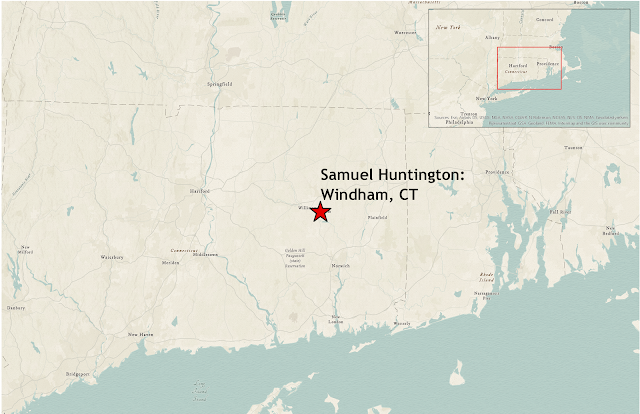Founding Fathers - Samuel Huntington
Samuel Huntington
Born: July 16, 1731 (Windham, Connecticut)
Died: January 5, 1796 (Norwich, Connecticut)
This week we'll turn our sites to the final delegate from Connecticut, but although he might be the last on our list he can claim several other firsts. Born on a farm just east of the town of Windham as the fourth of ten children, Samuel Huntington was the son of a farmer and clothier named Nathaniel Huntington and his wife Mehetabel. The family was active in life of the community, as Nathaniel's father had helped found the town, but young Samuel was not given the advantage of a formal education. Instead, he worked with his father on the farm and was eventually apprenticed to a cooper who trained him in the building of casks and barrels. Samuel enjoyed learning, however, and began borrowing books to study, particularly focusing on the subject of law. A nearby minister named Ebenezer Devotion was a source of both information and encouragement, and by the age of 23 Samuel passed the bar and moved to Norwich to establish his own legal practice. Just six years later, in 1761, he married the daughter of his benefactor, Martha Devotion. Although Samuel had come from a large family, he and his wife would remain childless throughout their 33 years together, although they adopted and raised the children of Samuel's younger brother, Joseph, upon his death.
After having lived in Norwich for a decade, Samuel Huntington had developed a successful business as well as a strong reputation among his peers. He was appointed to the Connecticut Assembly in 1765, and was elected to return each of the following ten years. At the same time, Royal Governor Jonathan Trumbull named Huntington as King's Attorney until 1774, when he elevated him to the Connecticut Superior Court. His position also placed him in the upper legislative body of the assembly known as the Governor's Council. Despite his connections to the royal government, Huntington was bold in his support of colonial rights as British subjects, as well as his objection to the Coercive Acts. In 1774 he helped lead a meeting in Norwich that pledged defense of Connecticut's liberties, as well as cooperation with other colonies. The following year he was chosen as a delegate to the Second Continental Congress, which he joined in January 1776. His committee work include Indian affairs, coastal defense, and military supply, but his attendance was intermittent at times due to bouts of illness and ongoing responsibilities in his home state.
After serving in the Continental Congress for over three years, Samuel Huntington was elected in 1779 to succeed John Jay as the body's President. During his term the Articles of Confederation, which he had also signed, was finally ratified after Huntington helped convince Maryland to relinquish their claims on the western lands that now make up Ohio. When it officially took effect as the governing document of the states, he became the very first man to hold the title of "President of the United States in Congress Assembled". Over a two year period, the man who was never able to attend college received honorary degrees from Yale, Princeton, and Dartmouth. In the summer of 1781 poor health once again forced Huntington to resign his position and he returned to Connecticut in hopes of enjoying time at home, which by that point included three adopted children. Just one month before the war ended at Yorktown, however, the turncoat Benedict Arnold led British forces against Connecticut and burned the town of New London, which was just a few miles downriver of Norwich. Once he was healthy enough to take the seat in the General Assembly that had been held open for him, Huntington quickly began to work once again, including writing the nation's first copywrite law.
Although Samuel Huntington declined the opportunity to return to Congress in 1782, he did accept an election one year later and traveled to Philadelphia in 1783 in time to see the Treaty of Paris officially conclude the Revolution and assure American independence. In 1785, Huntington was elected as Lieutenant Governor to serve alongside Matthew Griswold, and the next year when none of the candidates won a majority of the vote he was selected by the assembly to become the Governor of Connecticut. Among his accomplishments was brokering the Treaty of Hartford that settled conflicting claims in the west by both New York and Massachusetts, as well as the construction of a new capitol building in Hartford. He strongly supported the ratification of the US Constitution in 1788 and his popularity was such that, in addition to being re-elected annually in his own state, he actually received two electoral votes in the very first presidential election...good enough for eighth place. In 1796, less than two years after the death of his wife, Samuel Huntington passed away at the age of 64, the first active governor in the United States to die while in office. He was honored with a parade of dignitaries and buried near his home in Norwich.
The signature of Samuel Huntington can be found as the tenth name on the sixth (farthest right) column beneath the Declaration of Independence.



Comments
Post a Comment